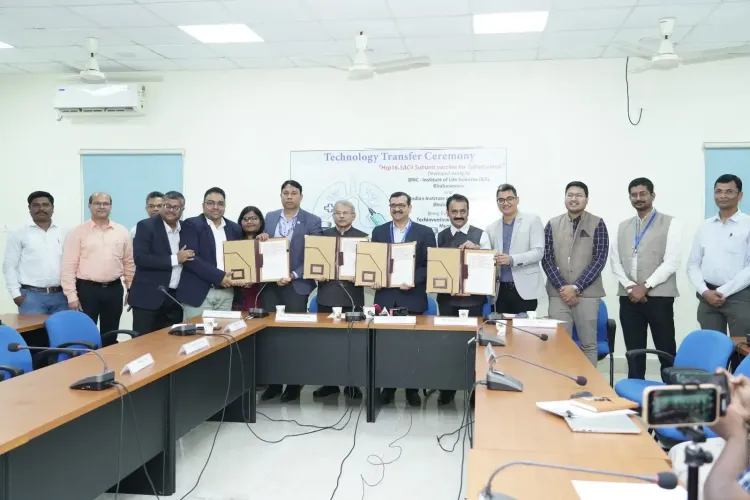Has IIT Bhubaneswar Signed an Agreement for a Novel TB Vaccine Technology?

Synopsis
Key Takeaways
- IIT Bhubaneswar and partners have signed a vital agreement for TB vaccine research.
- The HSP Subunit Vaccine aims to enhance immunity against TB.
- Collaboration highlights India's strength in public health innovation.
- The agreement facilitates technology transfer and commercialization.
- TB remains a significant global health threat.
Bhubaneswar, Nov 24 (NationPress) In a significant move to enhance indigenous TB vaccine research, IIT Bhubaneswar, the Institute of Life Sciences (ILS), and the National Research Development Corporation (NRDC) have entered into a Quadripartite License Agreement with TechInvention Lifecare Limited.
This agreement facilitates the transfer of technology and the potential commercialization of a promising new vaccine candidate, the “HSP Subunit Vaccine in Adjuvant (DDA) Against Mycobacterium tuberculosis.”
The goal of this agreement is to transition the vaccine from laboratory research to product development, eventually leading to its commercial deployment.
According to the World Health Organization, TB took the lives of 1.23 million people in 2024, marking it as one of the deadliest infectious diseases globally.
Despite this, the world still depends on the Bacillus Calmette Guérin (BCG) vaccine, which was formulated over a century ago, offering only limited protection, particularly to infants, and is largely ineffective in preventing pulmonary TB in older populations.
“To meet this urgent and unmet need, the next-generation HSP Subunit Vaccine has been created through collaborative research led by Prof. Ashis Biswas of IIT Bhubaneswar and Dr. Sunil Kumar Raghav of ILS Bhubaneswar,” stated a press release from ILS.
This vaccine candidate is engineered to elicit strong humoral and cell-mediated immune responses while boosting the effectiveness of the existing BCG vaccine.
Recognizing its substantial public health significance, NRDC took the initiative to identify and assess this technology, streamlining the licensing process to ensure its progress.
“The HSP Subunit Vaccine candidate, collaboratively developed by the esteemed institutions ILS and IIT Bhubaneswar, signifies a major leap in India's battle against Mycobacterium tuberculosis. This partnership underscores the strength of India's research landscape and its commitment to tackling pressing public health issues,” ILS added.
TechInvention Lifecare Limited, the licensed industrial partner, will play a crucial role in transforming this indigenous vaccine technology into an effective public health solution.









